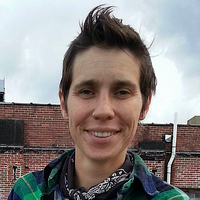 California Gov. Jerry Brown is having a hard time maintaining his green image. Like President Obama, Brown has stumped about the dangers of climate change and the need to take action. But Brown’s message runs afoul of his own actions to open California to more oil and gas drilling enabled by hydraulic fracturing and other extreme extraction methods.
California Gov. Jerry Brown is having a hard time maintaining his green image. Like President Obama, Brown has stumped about the dangers of climate change and the need to take action. But Brown’s message runs afoul of his own actions to open California to more oil and gas drilling enabled by hydraulic fracturing and other extreme extraction methods.
Demonstrators protested the governor and the president’s hypocrisy on the issue of fracking (Obama’s been singing the praises of natural gas) when the two were part of a climate change task force (or “task farce” as demonstrators made clear) in Los Angeles last month.
It’s not the first time Brown has come under attack since signing SB4 in September, a law to regulate fracking in California. Supporters of SB4, introduced by Fran Pavley, have called it the “toughest law in the country” (though it’s an extremely low bar) but opponents say it doesn’t go nearly far enough in protecting people and the environment, and until more is known about the dangers and health impacts the practice should be halted.
Thus far fracking had taken place in California with little regulation. Almost every major environmental organization pulled their support for SB4 as the bill became more watered down as it passed through the state legislature. A Los Angeles Times editorial summed it up: “We previously endorsed the bill, and Pavley deserves praise for trying, but at this point SB4 is so flawed that it would be better to kill it and press for more serious legislation next year.”
But the bill limped along to law and activists have taken to the streets and public forums to let the governor know they disagree with his signing. In October the governor failed to show up to receive a “Right Stuff” award from the Blue Green alliance, perhaps due to pressure from a group of environmental, labor and indigenous leaders who staged a protest believing Brown’s support for fracking, among other things, was not worthy of environmental merit.
In January, Californians Against Fracking delivered 100,000 public comments to the governor against increased fracking in the state. And last week, Brown endured hecklers at the state’s Democratic Party Convention, signaling a growing divide in his own party.
“While some delegates shouted ‘Ban fracking!’ others held aloft signs proclaiming ‘Another Democrat Against Fracking,’” reported David R. Baker for the San Francisco Chronicle. “The state party’s platform now calls for a fracking moratorium—an idea Brown rejects.”
Last week pressure group Oil Change International released a parody ad for a Frack Water cologne featuring a lookalike Gov. Brown. It’s a “fragrance that smells like a man … a man that doesn’t give a sh*t about drought or climate change” the ad says.
The majority of California has been designated as in an “exceptional” or “extreme” drought — not a pretty picture for a state that generates $45 billion a year from agriculture. Fracking uses a mix of water, chemicals and sand to break apart shale and release trapped oil and gas. The process has been known to use thousands to millions of gallons of water per well each time it is fracked (which can be multiple times). Estimates so far are that California’s geology requires less water than other parts of the country, but concerns still linger that any unnecessary use of water when the state is facing harsh drought conditions may be harmful. Fracking has occurred in areas that are already water stressed and where thirsty enterprises like agriculture are having water sources restricted.
Dan Bacher reported for the Daily Kos about rising opposition from farmers in the state:
“Water is the lifeblood of a farm — without clean, affordable water we cannot grow food,” said Shafter almond farmer Tom Frantz, who caught on video the illegal dumping of fracking wastewater in an unlined pit next to an almond orchard. “This drought has already put many of California’s small and midsized farms on the brink. To allow fracking on some of California’s most fertile agricultural land will further devastate California’s bucolic heritage. I don’t think this is the legacy that Governor Brown wants to leave behind.”
The disposal of wastewater from fracking in injection wells has also been proven to cause earthquakes in states like Ohio and Oklahoma. It’s not a scenario Californians are too happy about seeing in their own seismically active state.
On Saturday a coalition of organizations including Californians Against Fracking will hold a rally on the Capitol lawn in Sacramento at 1pm to call for an end to fracking in the state. “Just to make sure [Governor Brown] is listening, thousands of Californians will be headed to the Capitol to let him know that his love of fracking seems to be shared only by his Big Oil friends, not those he represents,” said Linda Capato, 350.org’s fracking campaign leader.
The rally has some wind in its sails. Less than two weeks ago, the Los Angeles City Council took a significant step toward banning fracking after a unanimous vote to prohibit fracking and other kinds of extreme extraction methods. The vote is not symbolic — LA has the country’s largest urban oil field. Next the city council will have to approve a new zoning ordinance that’s being drafted.
Those challenging the governor on fracking show an increasingly vocal opposition being echoed across the country highlighting that fighting climate change and increasing fossil fuel extraction of any kind are entirely incompatible. Elected officials can no longer straddle the line between environmental action and appeasing the oil and gas industry. It’s time to pick a side.
Pumpjack image via shutterstock. Reproduced on Resilience.org with permission.






